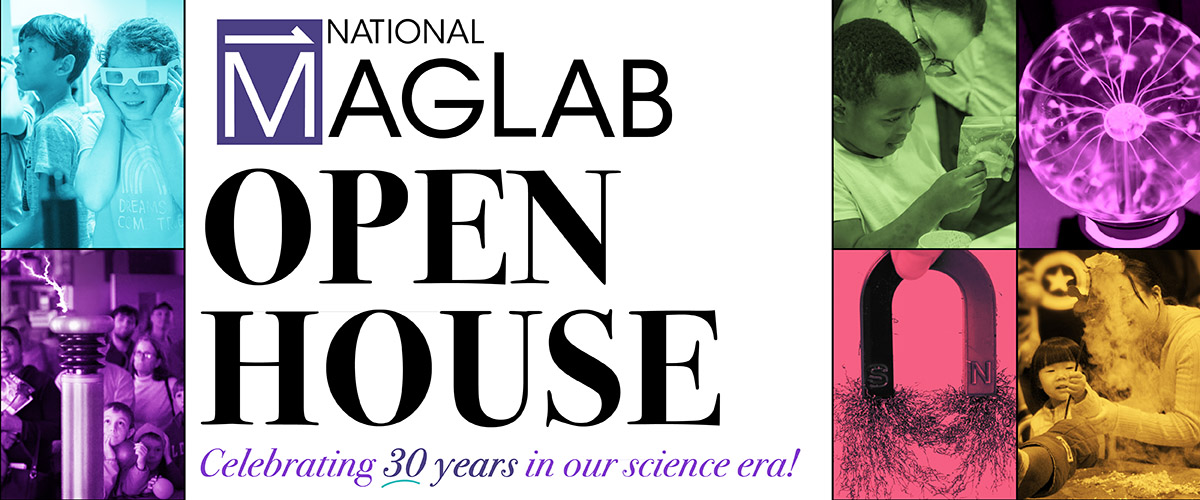
“It’s a love story, baby just say ‘yes’” to celebrating the MagLab’s “Science Eras” at the National High Magnetic Field Laboratory’s 2025 Open House.
The Open House will showcase the eras of the world’s largest and most powerful magnet lab over its 30 years — from visioning, building and launching to leading and evolving — while looking ahead to the inspiring future of magnet technology and discoveries.
The celebration will also incorporate themes from Taylor Swift’s wildly popular “Eras” tour. You can “Shake It Off” during a quantum dance party at the foot of the world’s strongest magnet or go on a scavenger hunt around the lab, collecting beads to make a MagLab friendship bracelet.
The free, hands-on science festival is set for this Saturday at the Florida State University-headquartered MagLab:
SATURDAY, FEB. 22
10 A.M. – 3 P.M.
NATIONAL MAGLAB
1800 E. PAUL DIRAC DRIVE
TALLAHASSEE, FLA.
The Eras extravaganza comes as the MagLab moves into a new era led by Kathleen Amm, who took over as lab director less than a year ago.
“I am so excited to take part in my first open house as director of the MagLab,” said Amm. “I was here as a grad student for the lab’s dedication and inaugural Open House 30 years ago, so this will really be a full circle moment for me.”
The event gives the public a chance to meet Amm and other lab scientists and staff, see the MagLab’s fleet of world-record magnets, and experience dozens of brain-teasing science demonstrations and activities.
Fan favorite demos will return, including a redesigned and even more powerful Potato Launcher, the incredible Quarter Shrinker, ultra-cool Frozen Flowers, the super-strong Junkyard Magnet, and delicious Einstein’s Ice Cream, made right before your eyes using ultra-cold liquid nitrogen.
Community groups, agencies and organizations will join the festival to share their enthusiasm for science and learning, including Tallahassee Scientific Society, WFSU Public Media, the National Weather Service, and LeMoyne Arts.
Several of the lab’s neighbors will open their doors as well, including the Center for Advanced Power Systems, the High-Performance Materials Institute, and the Aeropropulsion, Mechatronics, and Energy Center.
Fueling the fun and excitement, food vendors will offer meals and treats from hot dogs, pizza, barbecue, wings, and sandwiches to ice cream, snow cones and Italian ice.
Thousands are expected at the science celebration. MagLab Open House regularly draws crowds of more than 8,000 people. Visitors will come away with fun, fascinating experiences, and be inspired and excited about science.
“This is going to be an amazing day,” Amm said. “It’s a privilege to lead this lab and carry on this wonderful tradition, which is a testament to our amazing MagLab staff and the incredible support we get from the community.”
Open House will cap a week of events in Tallahassee centered around magnets. For the first time, the city is hosting an international Motor, Drive Systems and Magnetics Conference, showcasing the MagLab to global magnet technology businesses. The conference, being held Feb. 18-20, will also feature the unveiling of a new magnetically levitating sculpture inspired by the MagLab. The public art piece will spotlight Tallahassee as “The Magnetic Capital of the World,” a hub for research and innovation in magnet technology.
Funded by the National Science Foundation and the State of Florida, the National MagLab operates the strongest magnets in the world, supported by expert staff, researchers, engineers, and technicians. Nearly 2,000 researchers from across the US and from dozens of countries visit the lab annually to probe fundamental questions about materials, technology, energy, health, the environment, and the mysteries of the universe. The lab is headquartered at FSU and also operates facilities at the University of Florida in Gainesville and Los Alamos National Lab in New Mexico.



